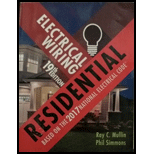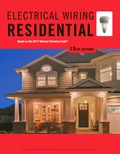
ELECTRICAL WIRING:RESIDENT.-TEXT (PB)
19th Edition
ISBN: 9781337116213
Author: MULLIN
Publisher: CENGAGE L
expand_more
expand_more
format_list_bulleted
Concept explainers
Question
Chapter 3, Problem 13R
To determine
Find the smallest size wire used in a branch circuit rated at 20 amperes.
Expert Solution & Answer
Trending nowThis is a popular solution!

Students have asked these similar questions
A Si step junction maintained at room temperature under equilibrium conditions has a p-side doping of
NA 2X1015/cm³ and an n-side doping of ND=1015/cm³. Compare
a) Vbi
b) Xp, Xn, and W
c) ɛ at x=0
d) V at x=0
Make sketches that are roughly to scale of the charge density, electric field, and electrostatic
potential as a function of position.
Can you show how this answer was found?
Can you show how this answer was found?
Chapter 3 Solutions
ELECTRICAL WIRING:RESIDENT.-TEXT (PB)
Ch. 3 - Prob. 1RCh. 3 - How are branch circuits rated? See NEC 210.3._____Ch. 3 - Prob. 3RCh. 3 - Prob. 4RCh. 3 - What spaces are not included in the floor area...Ch. 3 - What is the unit load per square foot for dwelling...Ch. 3 - According to NEC 210.50(C), a laundry equipment...Ch. 3 - How is the total load in volt-amperes for lighting...Ch. 3 - How is the total lighting load in amperes...Ch. 3 - How is the required number of branch circuits...
Ch. 3 - What is the minimum number of 15-ampere lighting...Ch. 3 - How many lighting branch circuits are provided in...Ch. 3 - Prob. 13RCh. 3 - How is the load determined for outlets supplying...Ch. 3 - What type of circuits must be provided for...Ch. 3 - Prob. 16RCh. 3 - In a single-family dwelling, how is overcurrent...Ch. 3 - Prob. 18RCh. 3 - The minimum number of outdoor receptacles for a...Ch. 3 - The Code indicates the rooms in a dwelling that...Ch. 3 - Prob. 21RCh. 3 - Prob. 22RCh. 3 - Prob. 23RCh. 3 - Prob. 24RCh. 3 - Prob. 25RCh. 3 - Although the Code contains many exceptions to the...Ch. 3 - The rating of a branch circuit is based on (Circle...Ch. 3 - a. A 25-ampere branch-circuit conductor is derated...Ch. 3 - Prob. 29RCh. 3 - Prob. 30RCh. 3 - Prob. 31RCh. 3 - Prob. 32RCh. 3 - A split-level home has one stairway that has six...Ch. 3 - Prob. 34RCh. 3 - Prob. 35RCh. 3 - Prob. 36RCh. 3 - In the past, it was common practice to connect the...Ch. 3 - If a residence has two bathrooms, the Code states:...Ch. 3 - Prob. 39RCh. 3 - Prob. 40RCh. 3 - Prob. 41RCh. 3 - Prob. 42RCh. 3 - Prob. 43R
Knowledge Booster
Learn more about
Need a deep-dive on the concept behind this application? Look no further. Learn more about this topic, electrical-engineering and related others by exploring similar questions and additional content below.Similar questions
- Can you show how this answer was found:arrow_forwardQ1 [2 point] Perform 13+10 in the following Adder- Subtractor: A= |B= A3 B3 IB2 B1 A0 BO FAH FAH FAH FA M CO Q2 [2 point] Perform 13-10 in the following Adder- Subtractor: A= B= A3 B3 A2 B2 A1 B1 A0 BO A = = BC= AB FA FA FA FA M COarrow_forwardMatlab Homework (20ps) A BFSK signal is transmitted through a channel with AWGN. Generate similar BFSK received signal plots as shown on next page. (20 pts) BFSK for eb-1 and npower=0.01 with 500 samples BFSK for eb=1 and npower=0.1 with 500 samples 2.5 2.5 2 1.5 1 0.5 0 -0.5 -1 2 1.5 1 0.5 0 0.5 -1 -1.5 1.5 -1.5 -1 -0.5 0 0.5 1 1.5 2 2.5 -1.5 -1 -0.5 0 0.5 1 1.5 2 2.5arrow_forward
- Can you show how this answer was found?arrow_forward1. You are to design a 9-volt battery operated baseband PAM communication system that must last great than 10 years without replacing the batteries. The application requires a BER of <10^-4 and a data rate of 200bps. The channel can be modeled as AWGN with a noise power spectral density of 10^-9 W/Hz and a channel loss of 10 dB. (a) Estimate the required capacity of the batteries. (The battery life (hours) is equal to the battery volts times of the battery capacity (Amps* hours) divided by the total load (Watts)) and (b) Can you easily find this battery? If not, what would you suggest be done?arrow_forward3. You are on a design team tasked to design a system of remote sensors that use PAM. Here is what the team knows/assumptions: The remote sensor will use a single AA battery required to power the sensors. The system has a bandwidth of 2KHz and requires a data rate of 12 Kbps and a BER of less than 1*10^-4. The typical channel has maximum losses of 35 dB and a noise power spectral density is 10^-9 W/Hz. Your boss assigns you with the task of estimating how long the battery will last.arrow_forward
- 2. The noise power (in watts) measured in a baseband PAM communication channel is 230*10^-6 Watts. The transmitter output power is 600 mW and has a data rate of 300 Kbps. The channel bandwidth is 100 KHz with losses that can be modeled as 0.5dB/meter. The application requires a BER ofarrow_forwardQ27arrow_forwardQ25arrow_forwardarrow_back_iosSEE MORE QUESTIONSarrow_forward_ios
Recommended textbooks for you
 EBK ELECTRICAL WIRING RESIDENTIALElectrical EngineeringISBN:9781337516549Author:SimmonsPublisher:CENGAGE LEARNING - CONSIGNMENT
EBK ELECTRICAL WIRING RESIDENTIALElectrical EngineeringISBN:9781337516549Author:SimmonsPublisher:CENGAGE LEARNING - CONSIGNMENT

EBK ELECTRICAL WIRING RESIDENTIAL
Electrical Engineering
ISBN:9781337516549
Author:Simmons
Publisher:CENGAGE LEARNING - CONSIGNMENT